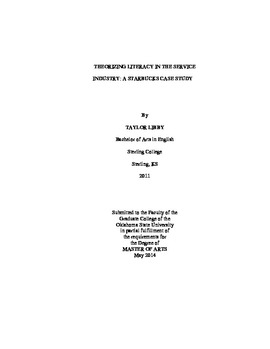| dc.contributor.advisor | Brooks, Ron | |
| dc.contributor.author | Libby, Taylor | |
| dc.date.accessioned | 2015-06-17T20:06:45Z | |
| dc.date.available | 2015-06-17T20:06:45Z | |
| dc.date.issued | 2014-05-01 | |
| dc.identifier.uri | https://hdl.handle.net/11244/14968 | |
| dc.description.abstract | This study relocates literacy, uprooting it from the classroom and placing it in the service industry, specifically Starbucks, in an attempt to examine the intersection of literacy and food service work. The first chapter frames the project by establishing a new metaphor for thinking about literacy within the food service industry that reflects literacy studies' call for theories about literacy specific to the context: literacy as performance. In this metaphor, literacy is physically incarnated-- exhibited and evaluated via the words and actions of employees as they engage in the daily activities demanded by their service industry job. A close examination of the literacy practices Starbucks workers employ as they take orders, interact with customers, vie for raises and promotions, and generally perform their daily tasks highlights the high level of language and literacy competence required of such jobs and challenges current conceptions of what literacy looks like outside the classroom. Though Starbucks is used a case study, the level of specialized language use, critical thinking, and interpretation that happens each day at Starbucks mirrors that of other food and beverage oriented workplaces across the country. Literacy as performance acts as a lens to examine the demands and expectations of food service work by providing new insight into how literacy manifests itself in this setting and challenging conventional views of what constitutes literacy. The examination of literacy practices at Starbucks is not simply an academic endeavor, but rather has practical implications for the company and others like it. Ultimately, the goal of examining literacy practices at Starbucks is to arrive at an understanding of the mental work involved in food service and to develop training practices that promote quick and effective acquisition of the literacy system. Altering training in the food service industry to reflect best practices from educational psychology and language acquisition studies can improve the learning situation in a way that encourages self-regulation and produces more efficient and proficient employees. | |
| dc.format | application/pdf | |
| dc.language | en_US | |
| dc.publisher | Oklahoma State University | |
| dc.rights | Copyright is held by the author who has granted the Oklahoma State University Library the non-exclusive right to share this material in its institutional repository. Contact Digital Library Services at lib-dls@okstate.edu or 405-744-9161 for the permission policy on the use, reproduction or distribution of this material. | |
| dc.title | Theorizing Literacy in the Service Industry: a Starbucks Case Study | |
| dc.type | text | |
| dc.contributor.committeeMember | Lewis, Lynn | |
| dc.contributor.committeeMember | Damron, Rebecca | |
| osu.filename | Libby_okstate_0664M_13264.pdf | |
| osu.accesstype | Open Access | |
| dc.description.department | English | |
| dc.type.genre | Thesis | |
| dc.subject.keywords | literacy | |
| dc.subject.keywords | workplace studies | |
